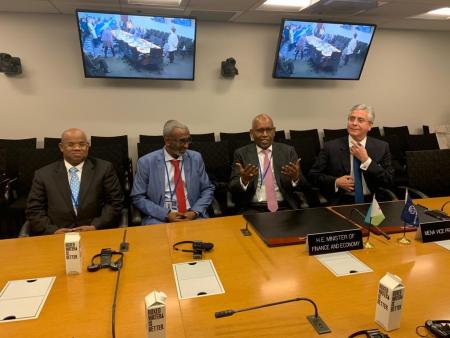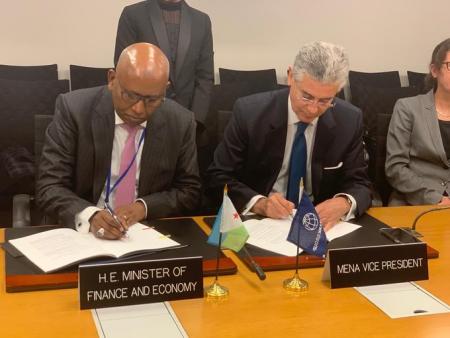Minister of Finance Ilyas Dawaleh signed Project which will expand quality education for 35,000 children with VP Mena Ferid Belhaj . Also with the presence of Minister of Budget, Abdoulkarim Aden Cher and Amb Mohamed Siad Douale .
The Expanding Opportunities for Learning Project will be funded by a US$10 million IDA credit and a US$5 million grant from the IDA-18 Sub-Window for Refugees and Host Communities, a mechanism created to provide concessional financing to lower-income countries hosting large numbers of refugees per capita. The new funding will allow the government to direct resources to areas that will have a transformative impact on basic education. The project will support this goal with a focus on four specific targets, including the establishment of foundations for quality preschool education, expanding access to and improving retention in primary and lower secondary education, building up the skills of teachers to improve learning, and strengthening the capacity of the ministry to manage the education system and use new digital systems for monitoring and measuring results.
“Our people are our future”, said Ilyas Moussa Dawaleh, Djibouti’s Minister of Economy and Finance in charge of Industry. “Djibouti is committed to ensuring that every child has the opportunity to develop the skills they need to realize their aspirations. This is a critical investment in building our human capital, which is our most precious asset and will be the engine of our future growth.”
Djibouti is building on the recommendations laid out in the recent report Expectations and Aspirations, a New Framework for Education in the Middle East and North Africa that learning should start early for all children regardless of background, with qualified and motivated educators. The project will further support these goals by shifting the focus toward results, with funds released only on the achievement of agreed-upon targets. Djibouti’s development partners are also coordinating closely around this effort to transform the education system, with US$9.25 million co-financing from the Global Partnership for Education (GPE).
“Djibouti has recognized that schools can only be changed from within,” said Boubacar-Sid Barry, World Bank Resident Representative in Djibouti. “This project will support ongoing efforts aimed at empowering school leaders and teachers, so they can work collaboratively to raise the quality of teaching and improve student achievement and other dimensions of school quality. At the heart of this effort is the establishment of quality standards for both teaching and student outcomes, and robust systems for measuring them on a regular basis.”
To read the full piece from The World Bank, click here.




